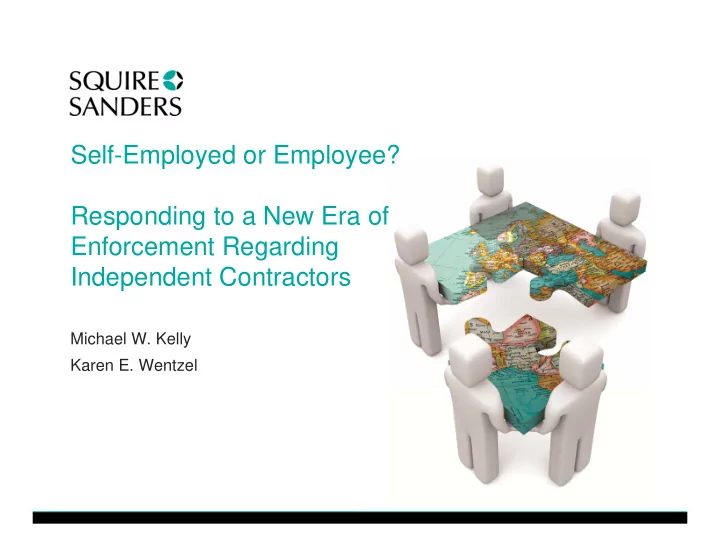

Self-Employed or Employee? Responding to a New Era of Enforcement Regarding Independent Contractors Michael W. Kelly Karen E. Wentzel
What are independent contractors? • No set definition but typically a worker who contracts with an employer to provide specialized services on a project or on an as- needed basis • Consultants, freelancers, contingent workers, self-employed, free agents, or “micropreneurs” 2
Independent Contractor relationships are on the rise Employers like IC relationships because they are about 30% cheaper overall: • No benefits • No unemployment insurance • No workers’ comp. coverage • No min. wage or OT requirements • No withholdings • Limited application of anti-discrimination laws 3
Independent Contractor relationships are on the rise Some IC’s like them too: • Flexibility • Autonomy • Tax benefits 4
Government Agencies are looking closely at IC relationships • 1 in 5 US workers is an IC • DOL estimates up to 1/3 of employers have at least one misclassified IC • $2.72 billion a year in unpaid Social Security, unemployment insurance and income taxes • Truck drivers, high tech engineers and construction workers are among the most often misclassified 5
Obama administration cracks down on ICs • Budgeted to add 200 additional tax auditors • 250 more wage and hour investigator • Set goal of reclaiming $7 billion for 2011 • Employee Misclassification Prevention Act of 2010, resubmitted in 2011 but not enacted • Instead, DOL’s “Misclassification Initiative” 6
Independent Contractor Tests The Common Law test • Looks at evidence of control and independence in the relationship • Three categories of evidence: � Behavioral Control, � Financial Control, and � the Relationship of the Parties. 7
Independent Contractor Tests “Economic realities” test (1) the extent to which the worker's services are an integral part of the employer's business; (2) the permanency of the relationship; (3) the amount of the worker's investment in facilities and equipment; (4) the nature and degree of control by the principal; (5) the worker's opportunities for profit and loss; and (6) the level of skill required in performing the job and the amount of initiative, judgment, or foresight in open market competition with others required for the success of the claimed independent enterprise. 8
EDD Audits • DE 38 � Significant Questions – Instruct or Supervise – Quit or be fired at any time – Work Part of regular business � Worker in business for self – Separately established business – Make decisions affecting profit or loss – Significant investment 9
EDD Audits (cont.) • DE 38 � Additional Factors – Employees doing same type of work – Furnish tools, supplies, etc. – Skilled or unskilled – Training – Salary, hourly wage or piece rate – Previously employed doing similar work – Worker believes employed 10
Exposure for getting it wrong • Back wages, benefits and OT (if non-exempt) for up to three years • Fines & penalties for state Labor Code violations • Tax liability • Liability for workplace injuries • Liability for workplace discrimination • Third-party liability 11
What to do? • Review your IC agreements • Train your hiring managers • Assess your risk • Consult counsel as appropriate • Take action sooner than later 12
Contact Information Michael W. Kelly michael.kelly@squiresanders.com +1 415 954 0375 Karen E. Wentzel karen.wentzel@squiresanders.com +1 650 843 3341
Recommend
More recommend